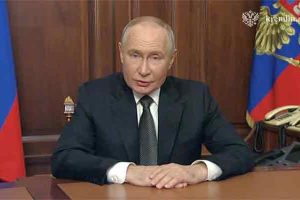
On Dec. 5, 2017, after determining that Russia had been operating a sophisticated doping operation, the International Olympic Committee suspended the country from participating in the 2018 Winter Olympics. (The ban that would later be extended thru 2022, including the current Games in Beijing).
In announcing the sanction, IOC president Thomas Bach declared Russia was guilty of “an unprecedented attack on the integrity of the Olympic Games.”
Yet despite the tough talk, there was a catch: Russian athletes who had never tested positive for performance-enhancing drugs could still compete under a shadow organization – in this case the “Russian Olympic Committee.”
Basically, it was the same people, same coaches, same colors … and the same win-at-any-cost mindset, just with a new name.
Still, the IOC braced for a reaction.
After all, Russian President Vladimir Putin had warned the IOC against levying sanctions. Russia claimed it was innocent and the real scandal wasn’t that it cheated, but that the United States — fearful of “honest competition” — made up the doping scandal. As such, a boycott, which might include additional Russian-aligned countries, was threatened.
When the “ban” was handed down, though, there was no boycott. There was hardly, at least by Russian standards, much of a reaction. Putin took the deal.
The former KGB agent understood, quite clearly, that he had just put Bach into a gift-wrapped box.
Putin could now cast Russia, via state-run media, as a victim of unfair Western aggression while still sending hero athletes to the Olympics, where their every triumph would be seen as a defiant victory over said Western aggression.
Russia could play the victim and the righteous bully at the same time.
“In the Olympics, it’s never just about figure skating or skiing or any sport,” Sarah Oates, a professor and expert in Russian propaganda at the University of Maryland, told Yahoo Sports. “It’s about national pride … So while the Olympics are supposed to be about how sport brings the world together, in reality, it’s a chance to showcase your own national narratives.”






